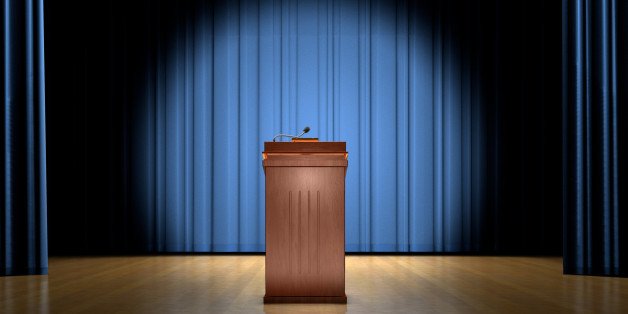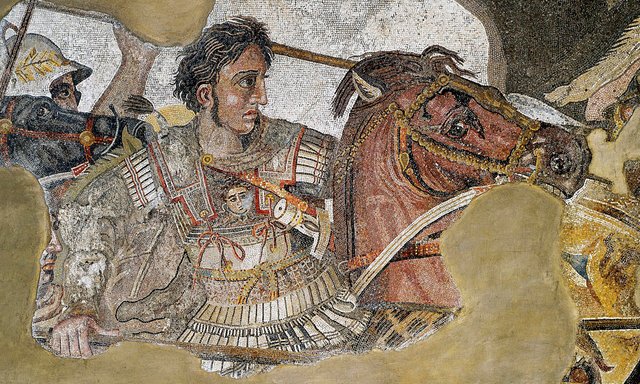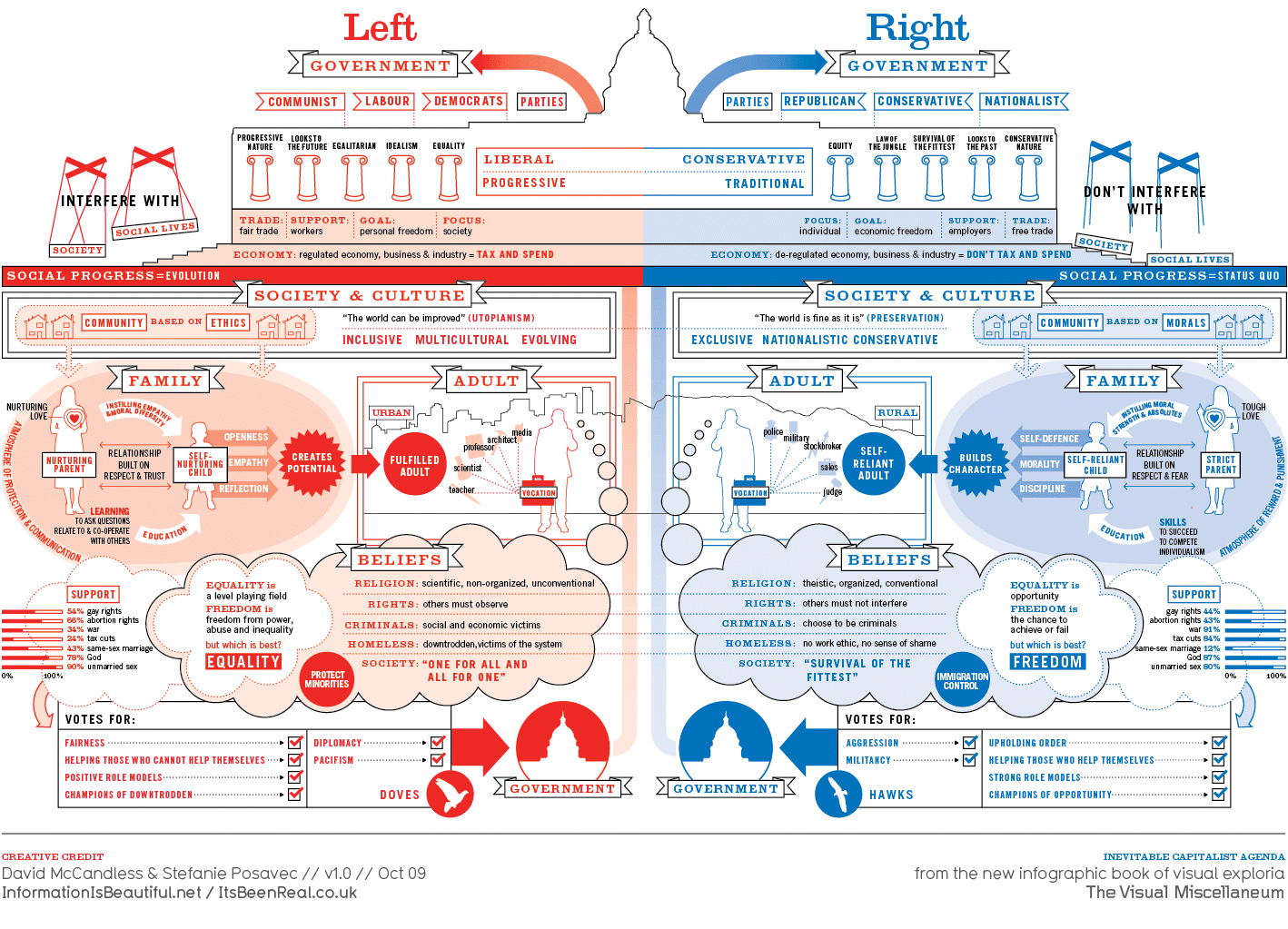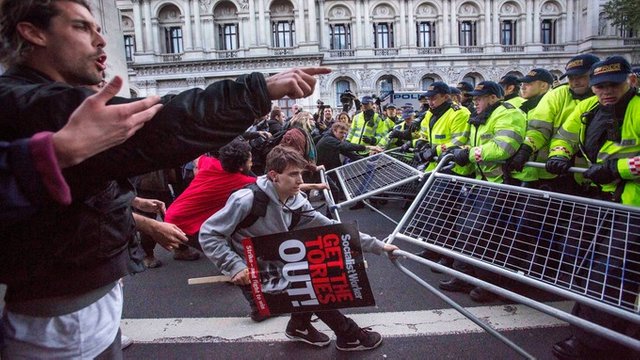Ideology And Politics: Opposite Sides Of The Power Coin
In life, ideology and politics are the opposite sides of the same power coin. Power today accumulates to those who yield capital of all forms, from technological to social, from economic to spiritual, and from intellectual to physical. A straightforward way to yield most of these forms of capital, and thus power, is to become involved with politics and ideology, seeking office. Depending on where you aim, your stack on the poker power table can be affected significantly, altering asymmetrically the bets you wage as a result.

The Podium, James Steidl via Getty Images
Politics has the ability to define or otherwise asymmetrically influence the social, technological and economic theatre of reality.
The new penguin English dictionary defines politics as the art or science of government. It also states that politics signifies the complex – and not the complexity – of relations between human beings in society or within an organization. Politics also gets a bad reputation: it is often unceremoniously associated with a ruthless drive for power. Nonetheless, politics is to be found in the office, in economic settings, whilst it defines the social experience. Politics is concerned with the containment or pursuit of conflict, with the ultimate purpose of realizing collective ends and values. This is an inevitable feature of human organization throughout the centuries. It occurs in all human interaction involving the exercise of influence and the distribution of scarce resources. Where politics becomes more noticeable is at the level of states, providing it with the modern authority we have come to understand in our very own age. This is after all the key reason that politics has been selected as the primary measure of power: its ability to define or otherwise asymmetrically influence the social, technological and economic theatre of reality.
It baffles the mind how whole armies of bureaucrats maintain complicated and intricate administrations that process and control power throughout a web of ministries, authorities, councils, and other sub-divisions of government. The naysayers of politics might have you thinking otherwise, but can you even fathom what it means to administer and govern a nation that produces trillions in wealth each year? I beg to differ with those that scream “inefficiency!” towards these administrations. Commanding the heights of political power is no easy matter and anyone who dared stepped into the political arena, especially in areas concentrated on administration, can testify to this reality.
Should we want to understand, jargon in absentia, how power operates today, we need to quickly turn our attention to where this power is personified most of all: global political leaders. Throughout history it has been a common occurrence that political leaders were simultaneously holders of power. In differing degrees, within major empires, kingdoms, and nation-states, politicians have altered their surrounding reality. Much alike today, world leaders arose firstly and primarily from their ability to hold the reigns of political power within their own societies. This allowed political leaders to methodically advance their causes in wide-ranging fields that count music, education, intrapersonal legal relationships, and military strategy to name a few.

Alexander The Great, DEA, G Nimatallah and De Agostini via Getty Images
##One of the first global leaders was Alexander the Great, who conquered the known world of circa 320 BC. Alexander was a great culturalist. He did, after all, transfer Greek civilization to corners of the world never before stepped on by Greek feet.##
One of the first global leaders was Alexander the Great, who conquered the known world of circa 320 BC. Alexander was a great culturalist. He did, after all, transfer Greek civilization to corners of the world never before stepped on by Greek feet. He carried a library around wherever he went, containing meticulously written papyruses, old-day books. After conquering one of the biggest swathes of land ever achieved by an army, he divided his Kingdom into carefully-thought out political entities, carrying history to what is known as the Hellenistic Age, and handed them over to Greek military leaders. In turn, these leaders installed their civilization and cultivated the populace to the Greek ways of logos and sofia, talking and wisdom, as well as the sword. Alexander the Great was much of a culturalist as today’s modern world leaders are. Leaders end up radiating their cultural perspectives through their postures, their speech, their actions, and their understandings of their surroundings as well as the way the communicate their decisions and actions.
Politicians and leaders need armies of supporters. Supporters can follow their idols throughout their lives and beyond, transferring their enthusiasm to future generations. Let’s take the example of George Washington. Even today, almost three hundred years after his death, the first U.S. president is still supported with ample enthusiasm and praise. He owned slaves and his orders ended up slaughtering tens of thousands. All these have never been a reason to let his support fade out. Mao Tse Tung, Stalin and Hitler have had similar paths, only their deaths count to the millions, yet this didn’t discourage support for a second.
How can power have such a strong effect? Enter the world of ideology. Political ideology is the primary mechanism through which political leadership is exercised and articulated. Leaders know that pervasive and consistent thought patterns inhabit their supporters’ minds and take advantage of it. Ideologies are not abstract nor obsolete. They are in operation today as much as they have been throughout the ages. Slavoj Zizek, the outspoken Slovenian Marxist philosopher, has made a living analyzing how ideology pervades and affects all areas of our lives. His criticism ranges from the way we structure toilets – English ones are practical while French have an observational capacity embedded to them – to how movies are made and what thoughts arise during copulation. Indeed, by analyzing these thought patterns across domains one can reach quite startling conclusions about the nature of human interpersonal and intrapersonal reality: ideology is today as powerful as ever.
##Each individual’s thought patterns might differ in their particulars but nonetheless have key common features that distinguishes them from others. Ideology is just one type of pattern thinking but it is the one with the most effect.##
Ideology is not abstract. It would be cynical to merely condemn ideologies as old approaches of power-thirsty and manipulative groups and individuals. Pragmatically speaking, ideology is not just superimposed but comes naturally from the way people think. We live in a world of ideologies. Each and every one of us has their own ideology, whether we are aware of it or not. Moreover, it doesn’t need to be expressed or articulated. This seemingly nebulous set of beliefs and perceptions is simply acted upon throughout our interactions with the universe around us, without us understanding it fully – if at all.
Ideology is synonymous with having a specific pattern of thought with other people around us. They concern what types of thoughts we make about societies, either ours or those of others. Each individual’s thought patterns might differ in their particulars but nonetheless have key common features that distinguishes them from others. Political ideology is just one type of pattern thinking but it is the one with the most effect. It translates to political domination and control. Ideologies have things to say about political arrangements as well as the various processes of a political community. These range from grand visions of a rich and harmonious future to plans for domination and control. At other times they become more modest. For example, constructing a fairer society or legislation, alleviating poverty, helping couples get along, protecting religion, or curbing immigration, are only some of the purposes at the spear of ideologies. The recent American elections had elements of all of these from the different candidates, left to right. Trump, for example, won on the vision of curbing immigration, renegotiating trade deals, and spending for infrastructure.
Some ideologies are more dominant than others. The left-right paradigm is still today, as an example, much stronger in comparison to, say, the movement of environmentalism or the fight for LGBTQ rights. In actuality, ideologies can embody other thought patterns such as the above and expand the base of people they can affect. In the end of the day, ideologies compete over the control of public matters, and therefore are primary motivators of power.

The Left-Right Paradigm
##In the end of the day, ideologies compete over the control of public matters, and therefore are primary motivators of power.##
The fight for political control is seen at the level of words as well as physical actions. When it comes to words, expressions take form in newspaper articles, debates, and television appearances. A startling example of major opinion shifts orienting from a battle of words came back in the age of Kennedy VS Nixon in 1960. Initially, public opinion was in favour of Nixon. However, the first presidential debates of history, four in the number, made Kennedy’s appeal much more pervasive in the public eye. Mass communication helped him seem much more imposing and impressive, swinging opinion towards his favour and ending up with a decisive win. When it comes to physical actions, these take the form of movements and protests. A very recent example is the protests against the South Korean President just last month, ending up with her impeachment by the country’s parliament. Closer to the west, nobody can forget the mass movements in Ukraine, the so-called “Orange Revolution”, and many Arab and North African countries, rightly named “Arab Spring”. Both of these movements ended up shifting the political landscape forever. In the end of the day, either through words or bodies, whoever controls the hearts and minds of people will end up in a strong position to implement their policies.
Politicians know very well that power serves the de-paralysis of society. Society itself needs to choose between different solutions to different problems that it faces. This is where ideology comes in play. Every one of the problems society faces comes with different solutions attached to it and political leaders take the helm of each representational situation. It doesn’t matter if more than one solution can be right. What matters is power radiating from one of those solutions. Ideologies provide different routes that can be taken on a map and perhaps different destinations as well, even though none may be ideal, but nonetheless each one claims that it is the only right path to take.
Let’s take the example of a mass street demonstration being policed outside of a parliament. The crowds are roaring and chanting, people are screaming through megaphones, shield-holding police are wearing helmets and are ready with tear-gasses for every occasion. The scene is obviously one were emotions are running high. If you are a conservative leader, you might rightly say that police are containing the situation. Perhaps you might even suggest that the crowds should dissolve. Instead, this leader says that people should petition the government with assiduously written letter to their representatives and stop wasting valuable time and public money. On the other hand, a liberal leader might articulate their fascination with the very idea of the demonstration. Such a leader would probably say that assembling and protesting is a fundamental right, and as such should be respected on every level. They would support this civil right to the death, claiming that societies should be disturbed if individuals are to preserve their valuable freedoms. The price we are paying is thus reasonable. An anarchist leader might take an even more radical step. This leader might suggest that physical confrontation is the only way to upset the ruthless political classes that rule over their society. Perhaps, even more commitment to the streets and megaphones is needed, with the ultimate purpose of removing government wholesomely.

Mass Street Demonstration, Rick Findler via PA Wire
##The crowds are roaring and chanting, people are screaming through megaphones, shield-holding police are wearing helmets and are ready with tear-gasses for every occasion. The scene is obviously one were emotions are running high.##
The above situation clearly shows how the differing ideological maps provide a podium for political leadership. Some of us like to preserve, others to disrupt. Through such situations, power radiates and ultimately leaders gain support. Leaders will use all the weapons available, from physical confrontation to the internet’s and television’s ability to affect the masses. Different ideologies become their guiding principles and through them they end up controlling the masses. Ideologies reflect these fundamental and diverse attitudes to changes.
Some of us may think we are not political but reality would tell us this is hardly ever the true case. We are hostile or friendly to some ideas based on our ideologies, from the way we engage with friends to the views we have about public housing. Political leaders arise to power through their articulation of our own thought patterns, otherwise known as ideologies.
As we end up nodding our head to their speeches, leaders gain power. This brings us back to our initial idea of the coin of power. Political leaders can amass capital through their power projections, utilizing ideology by manipulating the various social, economic and technological situations that affect our daily lives. In my own view, staying out of the political arena is not a sensible option to take. After all, as Plato has said, “To prefer evil to good is not in human nature; and when a man is compelled to choose one of two evils, no one will choose the greater when he might have the less… One of the penalties for refusing to participate in politics is that you end up being governed by your inferiors.”
Congratulations @elec365! You received a personal award!
You can view your badges on your Steem Board and compare to others on the Steem Ranking
Vote for @Steemitboard as a witness to get one more award and increased upvotes!